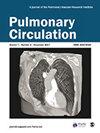Scoping review of post-TB pulmonary vascular disease: Proceedings from the 2nd International Post-Tuberculosis Symposium.
IF 2.2
4区 医学
Q2 CARDIAC & CARDIOVASCULAR SYSTEMS
引用次数: 0
Abstract
Tuberculosis (TB) may cause significant long-term cardiorespiratory complications, of which pulmonary vascular disease is most under-recognized. TB is rarely listed as a cause of pulmonary hypertension (PH) in most PH guidelines, yet PH may develop at various stages in the time course of TB, from active infection through to the post-TB period. Predisposing risk factors for the development of PH are likely multifactorial, involving active TB disease and post-TB lung disease (PTLD), host-related and environment-related factors. Moreover, post-TB PH should likely be classified in Group 3 PH, with the pathogenesis similarly complex and multifactorial as other Group 3 PH causes. Identifying risk factors that predispose to post-TB PH may aid in developing risk stratification criteria for early identification and referral for confirmatory diagnostic tests. Given that universal screening for PH in TB survivors may be impractical and unfeasible, a targeted screening approach for high-risk individuals would be sensible. In this scoping review of post-TB PH, resulting from the proceedings of the 2nd International Post-Tuberculosis Symposium, we aim to describe the epidemiology, risk factors, and pathophysiology of post-TB PH. We emphasize diagnosing PH with an alternative set of diagnostic guidelines in resource-constrained settings where right heart catheterization may not be feasible. Research to describe the burden and distribution of post-TB PH should be prioritized as there is a current gap in knowledge regarding the prevalence and incidence of post-TB PH among persons with TB.结核病后肺血管疾病的范围综述:第二届结核病后国际研讨会论文集》。
肺结核(TB)可能会引起严重的长期心肺并发症,其中肺血管疾病最不为人所知。在大多数 PH 指南中,肺结核很少被列为肺动脉高压(PH)的病因,但肺动脉高压可能发生在肺结核从活动性感染到结核病后的不同阶段。PH发生的诱发风险因素可能是多因素的,涉及活动性结核病和结核后肺病(PTLD)、宿主相关因素和环境相关因素。此外,肺结核后 PH 很可能被归入第 3 组 PH,其发病机制与其他第 3 组 PH 病因一样复杂且具有多因素性。找出导致结核病后 PH 的风险因素有助于制定风险分层标准,以便及早识别和转诊进行确诊检查。鉴于对结核病幸存者进行 PH 的普遍筛查可能既不实际也不可行,因此对高危人群进行有针对性的筛查是明智之举。本篇关于结核病后 PH 的综述是第二届国际结核病后研讨会的成果,我们旨在描述结核病后 PH 的流行病学、风险因素和病理生理学。我们强调,在资源有限、无法进行右心导管检查的情况下,应采用另一套诊断指南来诊断 PH。由于目前对肺结核患者中肺结核后 PH 的患病率和发病率缺乏了解,因此应优先考虑对肺结核后 PH 的负担和分布进行研究。
本文章由计算机程序翻译,如有差异,请以英文原文为准。
求助全文
约1分钟内获得全文
求助全文
来源期刊

Pulmonary Circulation
Medicine-Pulmonary and Respiratory Medicine
CiteScore
4.20
自引率
11.50%
发文量
153
审稿时长
15 weeks
期刊介绍:
Pulmonary Circulation''s main goal is to encourage basic, translational, and clinical research by investigators, physician-scientists, and clinicans, in the hope of increasing survival rates for pulmonary hypertension and other pulmonary vascular diseases worldwide, and developing new therapeutic approaches for the diseases. Freely available online, Pulmonary Circulation allows diverse knowledge of research, techniques, and case studies to reach a wide readership of specialists in order to improve patient care and treatment outcomes.
 求助内容:
求助内容: 应助结果提醒方式:
应助结果提醒方式:


